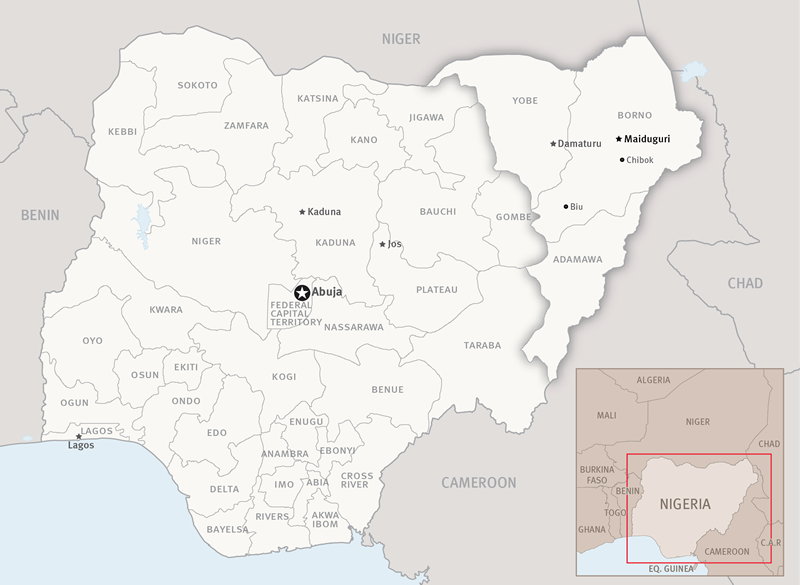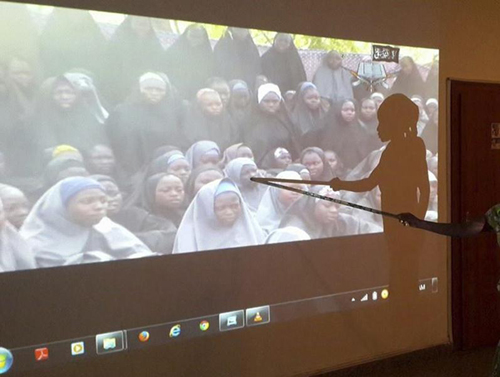The kidnapping of nearly 300 schoolgirls from Chibok, Nigeria by the Islamist militant group Boko Haram last April shocked the world. A social media campaign – #BringBackOurGirls – became the international rallying cry for their release. Sadly, these aren’t the first, or the last, girls to be kidnapped by Boko Haram – it has become a standard part of the group’s violent insurgency in northeastern Nigeria.
The Human Rights Watch Nigeria researcher Mausi Segun spent months tracking down the few girls who escaped from Boko Haram and were courageous enough to share their experiences. What she learned: That new fears set in after their escape, that their families have no protection from Boko Haram’s revenge attacks, and that, while the government has offered escaped Chibok girls some medical care and counseling, girls kidnapped before or after this terrible incident receive no support for the physical and emotional scars of their ordeals. Segun speaks with Amy Braunschweiger about why she began researching Boko Haram kidnappings months before the Chibok girls were taken, and what Nigeria needs to do to support the girls if they are found.

You began researching Boko Haram’s kidnappings of girls in earnest about four months before the insurgents abducted the Chibok students. Why did you choose this topic?
I chose it partly because the issue was so underreported. I would get information through word-of-mouth, and a little bit through the media. No one was making a concerted effort to document what was happening to these women and girls. Before Chibok, we had gone into the field a couple of times to investigate these kidnappings, and it was nearly impossible to speak with anyone who had been directly affected. There was such a hush around it. People would say it happened, but they’d inevitably say that it didn’t happen to anyone they knew. The shame surrounding the whole experience made it difficult for people to acknowledge. Families have moved away from their villages because of the stigma.
The attack on the Chibok schoolgirls confirmed what we already suspected – that this issue will only grow bigger, in part because no one tried to stop it. The government’s efforts to protect the local population, including women and girls, from Boko Haram’s attacks have been inadequate. The problem is so serious that in the remote parts of Borno State, Nigerian families sometimes send their daughters far away with little means of protecting themselves and little money because their families don’t want them to be Boko Haram’s next victim.
What has the government’s response been to the girls who escaped Boko Haram?
I had personally spoken with girls who escaped Boko Haram, and villagers had confirmed the kidnappings. But before the kidnapping of the Chibok girls, government officials in northeast Nigeria would often deny that the insurgency and the kidnappings were happening. Sometimes they would admit to women being taken, but nothing more specific. Since Chibok, they admit other kidnappings happen, but still downplay the scale.
The government’s attitude can be illustrated by the May arrest of two women who led the #BringBackOurGirls protests in Abuja, Nigeria, allegedly at the behest of President Goodluck Jonathan’s wife, Patience. She accused the women of making her husband’s government look bad.

We spoke with Chibok schoolgirls who escaped the insurgents, and to other girls who were kidnapped. They were forced to live alongside the insurgents for days or months before managing to escape. All these girls needed professional counseling. Several girls showed signs of stress when talking about their experiences. One stopped mid-sentence and stared into space, another hit herself repeatedly – we had to stop the interview until she calmed down. The girls said that their fathers tried to counsel them, or that their pastors told them to pray. But they needed more.
Some of the girls also had physical injuries. The Chibok girls fell from trucks as they escaped, and were hurt. Some of the women and girls from the other abductions who were held longer had been raped and had become ill from living in the bush. Yet the only medical assistance they received after their escape was paid for out of their parents’ pockets.
What the government needs to do is to ensure that these victims have the information they need to access mental health and medical care. The government should also take steps to investigate the crimes committed against them and ensure that the perpetrators are prosecuted.
Did anyone ask the girls who escaped what they learned about Boko Haram?
Shockingly, police and government representatives rarely if ever attempted to get the testimony of the girls who escaped. Yet the girls had incredibly important information about Boko Haram – such as how their chain of command operated.
We know the abducted girls were assigned domestic chores like cooking, and some were forced to marry and have sex with Boko Haram members. It indicates that Boko Haram may be replacing the families the fighters left behind when the Nigerian military forced them from their villages into the bush.
We also learned that the insurgents targeted women and girls of Christian faith and forced the girls to convert to Islam. Though women and girls were also at times indiscriminately abducted, the group was more likely to let Muslims go. Northern Nigeria has historical tension between its Christian and Muslim communities, and Boko Haram is further fraying that situation.
The interviews could really have brought useful information to light.
Yes. And they would also give us insight as to what the Chibok girls could be going through.
I spoke with one young woman, Gloria*, who was only 19 when she was kidnapped with her young baby along with five other women shortly after the Chibok students were taken. She was taken to their camp and told to sleep under a tree. At night, an insurgent woke her and told her that their leader wanted to meet her, leading her into the dark bush. Then he told Gloria to lie on the ground and to put her baby to the side. She began to cry and begged him not to hurt her. He said, “I will either kill you or I have my way.” Then he raped her.
The next day, the insurgents released Gloria after she pretended to convert from Christianity to Islam. She was held for four days.
Barely anyone knew Gloria had been raped, she kept her pain inside. She had to be encouraged to accept our recommendation to accept help from those who can provide her with the medical and psychological treatment that she obviously needed. Her husband sat in another room while we interviewed her, and she said she would never tell him about the rape – she’s afraid he may change his mind about being married to her. Then she switched to English and said, “I am so angry, I feel cheated. I would like to forget it but I can’t forget it.” She’s just bottling up all this anger, and she has no help. Her pain touched everyone in the room.

Did you speak to anyone who was held for longer?
Hauwa* was 18 last year when she was kidnapped by Boko Haram and held for three months.
Hauwa interacted directly with the leader of that particular Boko Haram cell, and she knew many insurgents’ names and identifying features. She went out on raids and helped carry ammunition. She had detailed information about how the camp operated, where it was located in Gwoza, and what its relationship was with the main Boko Haram camp in Sambisa forest. She even had information about how Boko Haram monitored security groups.
One of her worst memories, she said, was the time Boko Haram used her as bait to lure in new fighters. They asked her to find Christian men. She did, asking five young men to help her with something in the bush. When they followed her into the forest, Boko Haram members grabbed them, forcing them back to their camp. They tied the men down, and asked them to renounce Christianity, accept Islam, and become members of Boko Haram. When they refused, the insurgents began to cut their throats, one-by-one. Hauwa was ordered to cut the throat of one of the men, but she wouldn’t, she said. There was so much blood everywhere, and she wouldn’t even take the knife. The cell leader’s wife grabbed the knife and killed him instead.
She escaped, but her ordeal is far from over. According to other girls who escaped Boko Haram, the insurgents are looking for her. They believe she is pregnant with their leader’s child, and they want the baby, “They want their son,” she was told. She moves from house to house almost every night, hoping the insurgents won’t find her.
Despite the international furor created by the #BringBackOurGirls campaign, the kidnappings haven’t stopped.
In September, another 50 women were taken from the town of Gulak when Boko Haram took over the town.
In late June, more than 60 women and girls, as well as about 31 young men, were abducted from Damboa in Borno state. Once again, the government denied the kidnapping happened while local contacts confirmed it. But then media reports surfaced later that as many as 40 people claiming they were kidnapped by Boko Haram – possibly from this group – managed to escape and flee to a military base. Shortly thereafter, other reports claimed the escapees had been recaptured by Boko Haram. This leads to a number of questions, the biggest one being whether the Nigerian government is really in control of these areas. Or is everyone at the mercy of these insurgents?
But it’s not just Boko Haram who are acting abusively in the northeast.
Nigerian security forces have committed terrible abuses in the fight against Boko Haram. The military has conducted massive arbitrary raids and arrested thousands of people without cause. They’ve tortured people in detention, “disappeared” people, and even killed people. Since mid-2013 morgue records from hospitals in the northeast showed that they had received thousands of corpses from military detention centers. These corpses show signs of torture and starvation. Some of the people appeared to have been executed. Yet the government hasn’t taken any steps to investigate or bring anyone to justice.
Where do they think the Chibok girls are now?
The Nigerian government continues to negotiate for the release of the girls behind closed doors, my sources tell me, although the government denies this publicly. Based on the information we’ve received, they’ve been split up into groups, and are in at least five different camps, some in Nigeria, some in Cameroon or Niger. Rescuing them would be difficult, as freeing the girls at one camp could put the girls in other camps at risk of being killed.
But the government really needs to ensure that the girls and women who were abducted and then escaped get the necessary physical and psychological treatment. They’ve endured terrible acts, ones that potentially could ruin the rest of their lives, unless they get the care they need. The programs and funds that have been put in place for the Chibok students should provide for these survivors as well.
*a pseudonym